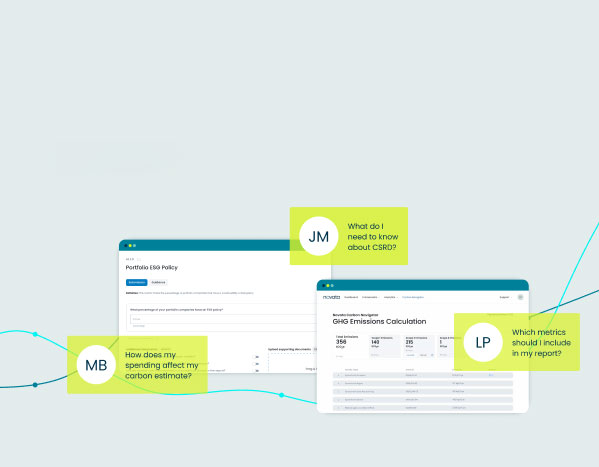More than ever, action on climate change needs to be a top priority for the global community. According to the World Economic Forum’s Global Risks Report, climate change is the largest long-term global risk our society faces today. The failure to mitigate climate change and protect people and ecosystems from its impacts are now the biggest global risks over the next 10 years.
To chart a course forward for global climate action, the UN Framework Convention on Climate Change (UNFCCC) Conference of the Parties (COP) convenes global leaders to discuss proactive action and remediation strategies. Most recently, countries came together in Sharm El-Sheikh, Egypt for the 27th Conference (COP27), held on November 6–18, 2022.
With COP27 in the rearview, implementation of the world’s collective climate goals continues to loom large for governments and public and private sector players. Preventing the most extreme climate catastrophes will require cross-sector action from all parties, including the corporate sector. To learn more about the priorities shaping global climate action, Novata caught up with Gonzalo Muñoz, President at TriCiclos and Novata’s ESG Advisory Council* member, who attended COP27. Below are his reflections and takeaways on key themes from the event.
1. Addressing Loss and Damage
Given that the COP27 conference took place on the African continent, the major focus was on pressing issues in the region: Adaptation, Resilience, Finance, and, especially, Loss and Damage. According to Gonzalo, Loss and Damage is a topic that has been largely deprioritized on the COP agenda for roughly three decades. However, COP 27 leaders placed it high on the agenda for this year’s event, with significant outcomes. “We can consider one of the main achievements [of COP27] to be the establishment of the conditions for a global fund to cover this long-awaited need,” he said.
Loss and Damage can generally be understood as the negative impacts of climate change that occur despite (or in the absence of) mitigation and adaptation. Loss and Damage usually occur as a result of extreme weather events (heat waves, hurricanes, etc.). The impact of climate change is usually unequally distributed, i.e., it continues to harm vulnerable communities the most, making addressing the issue a matter of climate justice. The global fund established at COP27 would provide financial assistance to nations most vulnerable to and impacted by the effects of climate change – a major win for Loss and Damage efforts. You can learn more about the COP27 Loss and Damage Fund, and why it’s critical to helping climate-vulnerable developing countries here.
2. Building a Resilient World
Gonzalo noted that COP27 also accelerated the agenda for Adaptation and Resilience, which focuses on protecting people and ecosystems from the impacts of a changing climate. Examples include ensuring infrastructure can withstand more extreme weather, or helping communities reduce their risk from sea level rise and increased floods.
To that end, a report presented by Nicholas Stern unveiled a framework for finance on how to effectively approach climate action. The report explores the opportunity to mobilize private finance to increase investment in climate initiatives and leverages science-backed research to prove that necessary climate action will require strong investment and innovation with tailored finance delivered at the right time. Key areas of investment include transforming the energy system, addressing the global vulnerability of developing countries to climate change by investing in adaptation and resilience efforts, and repairing damage to natural capital and biodiversity.
Additionally, the Sharm El-Sheik Adaptation Agenda was introduced during the event to focus global action on 30 adaptation targets needed to improve resilience by 2030. “The Agenda is now helping businesses understand what to implement in order to help improve resilience for the four billion people that are the most vulnerable to the climate stress and impacts,” Gonzalo said.
3. Mitigating Climate Impacts
On the other side of the coin, there was little progress on Mitigation (i.e., avoiding and reducing emissions of heat-trapping greenhouse gasses into the atmosphere to prevent the planet from warming to more extreme temperatures). “There was a moment when there was a risk of regressing climate goals outlined in the Glasgow Pact,” Gonzalo reflected, adding that keeping the Glasgow Pact intact as originally established was a major win at COP27. The Glasgow Pact, established at the 2021 United Nations Climate Change Conference (COP26), is the collective agreement to strengthen efforts to limit the rise in the global average temperature to 1.5°C. With the Pact protected at this year’s event, the world expects the parties to accelerate, implement, and deliver on these commitments, he added.
4. Increasing Accountability Around Net-Zero Commitments
According to Gonzalo, “one of the most important reports launched at COP27 came from the High Level Expert Group. The Group was organized by the Secretary-General in order to meet net-zero carbon emissions targets outlined at COP26.” The new report gave clear specifications for non-state actors, including businesses and investors, on what should be considered a real net-zero commitment. The recommendations outlined in the report are intended to curb net-zero greenwashing, increase accountability around pledges, and put the world on track to effectively manage carbon emissions and prevent the rise in global temperatures to 1.5°C. “Those conclusions were very well-aligned with the Race To Zero criteria,” Gonzalo said.
The Focus Turns to Action
While COP26 was about outlining commitments, COP27 centered on action. Outside of the direct negotiations, there were also commitments from various stakeholders in stopping deforestation, phasing out fossil fuels, accelerating renewables, advancing green hydrogen technologies, and increasing electromobility.
Moving the needle on addressing climate change will require multi-sector and cross-sector collaboration. Countries and businesses, both in the public and private sector, need to be a part of the solution to tackle climate change. The lack of more effective cooperation will lead to increasing global warming and ecological breakdown. As UN Secretary-General António Guterres noted in his closing address: “COP27 concludes with much homework and little time.”
Corporate commitments on climate action should establish measurable goals in line with science-backed targets. You can’t change or improve what you aren’t measuring. Check out Novata’s blog post outlining which metrics to track to help you start tracking your environmental impact and join the fight against climate change.
About Novata’s ESG Advisory Council*
Novata’s ESG Advisory Council is a group of leading experts in ESG with broad-based experience in academia, research, public and private company stewardship, investment management, and impact-driven initiatives. The Council advises Novata on the most effective way to help private companies and their owners navigate, operationalize, and extract value from ESG data.






